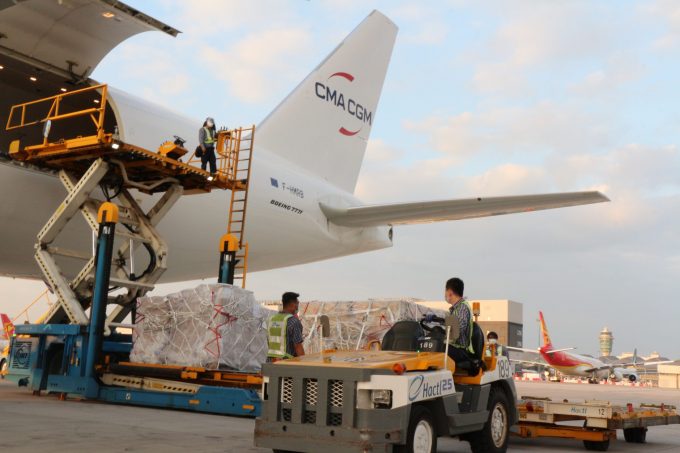Maersk Air Cargo applies to operate aircraft in UK
Maersk has applied for a UK aircraft operating licence, to operate charter and scheduled flights ...

CMA CGM Group was typically opaque in reporting its third-quarter financial results, which wrap its air cargo arm into “other activities” – which includes port terminals.
While revenues from the ‘other’ division rose 5.3%, to $526m, ebitda dropped more than 58%, to $56m.
CMA said the fall was mainly due to fewer volumes for the terminals division, and added: “The air freight market was affected by higher capacity in the face of weak demand.”
However, one source at the group said that, during last week’s internal business update, managers were told that the results – and outlook – were not good.
“The airfreight product is losing money globally now,” claimed the source.
CMA CGM operates three A300-200Fs and two 777Fs, which ply their trade between Europe, the Middle East, China and Africa. It has a deal with AF-KLM on the commercial side for all operations excluding North America.
It’s not the only airline finding the going tough. Maersk, which also hides its air cargo business, under Logistics & Services, said last week it had been “impacted by lower rates, particularly in the air and haulage market, and by lower volumes for lead logistics and e-commerce. Profitability decreased …”
It said: “Estimates point to a continuation of the decline for air freight volumes in Q3, in line with the -12% year on year in Q2 and Q1. Global cargo load factors, a measure of utilisation of capacity, declined in Q3. Rates, measured by the Baltic Air Freight Index, declined 46% compared with Q3 22, although they are higher than pre-pandemic.”
As a result of the poor market and results, CMA CGM Group is focusing on cost cutting. In September, the company told Ceva staff that selling, general and admin (SG&A) costs were “not coming down fast enough, particularly in view of the very challenging market”.
As a result, it imposed a “strict travel ban” as well as remote-only events and a hiring freeze.
The airfreight market is facing low demand for general cargo, with e-commerce one of the few bright spots. One forwarder, however, noted that he expected to see a move towards more sea-air products – something CMA CGM Air Cargo should be able to manage. It currently flies to Abu Dhabi, where the group also has an investment in Khalifa port.
However, sea-air routes are known to work only at certain rate points – and the forwarder thought the best sea-air route at the moment was Asia to the US and on to Latin America. CMA does not fly in the Americas.
The French airline has another challenge: CMA CGM, which owns Ceva and is looking to integrate Bolloré, is thought to be struggling to attract other forwarders to opt for its carrier services, including air.
One CMA CGM Group source told The Loadstar: “Other forwarders are wary of the relationship between CMA and Ceva. And they definitely should be wary of it; their concerns are completely justified.”
Ceva – or rather CMA CGM Group’s logistics division – saw revenue fall 15%, to $3.67bn in the third quarter, with ebitda down 3%, to $348m. It said: “The stability of the logistics business at a time of declining trade reflects, on one hand, the slowdown in freight markets, and on the other hand, the strengthening of the service offering and the resilience of certain activities.
“Freight management activities were impacted by the declining market, that also affected the shipping segment. Contract logistics held up well, particularly in Europe. Finished vehicle logistics activities continued to perform well, supported by favourable market dynamics, attributable to sustained demand, with supply chains returning to normal.”
Comment on this article